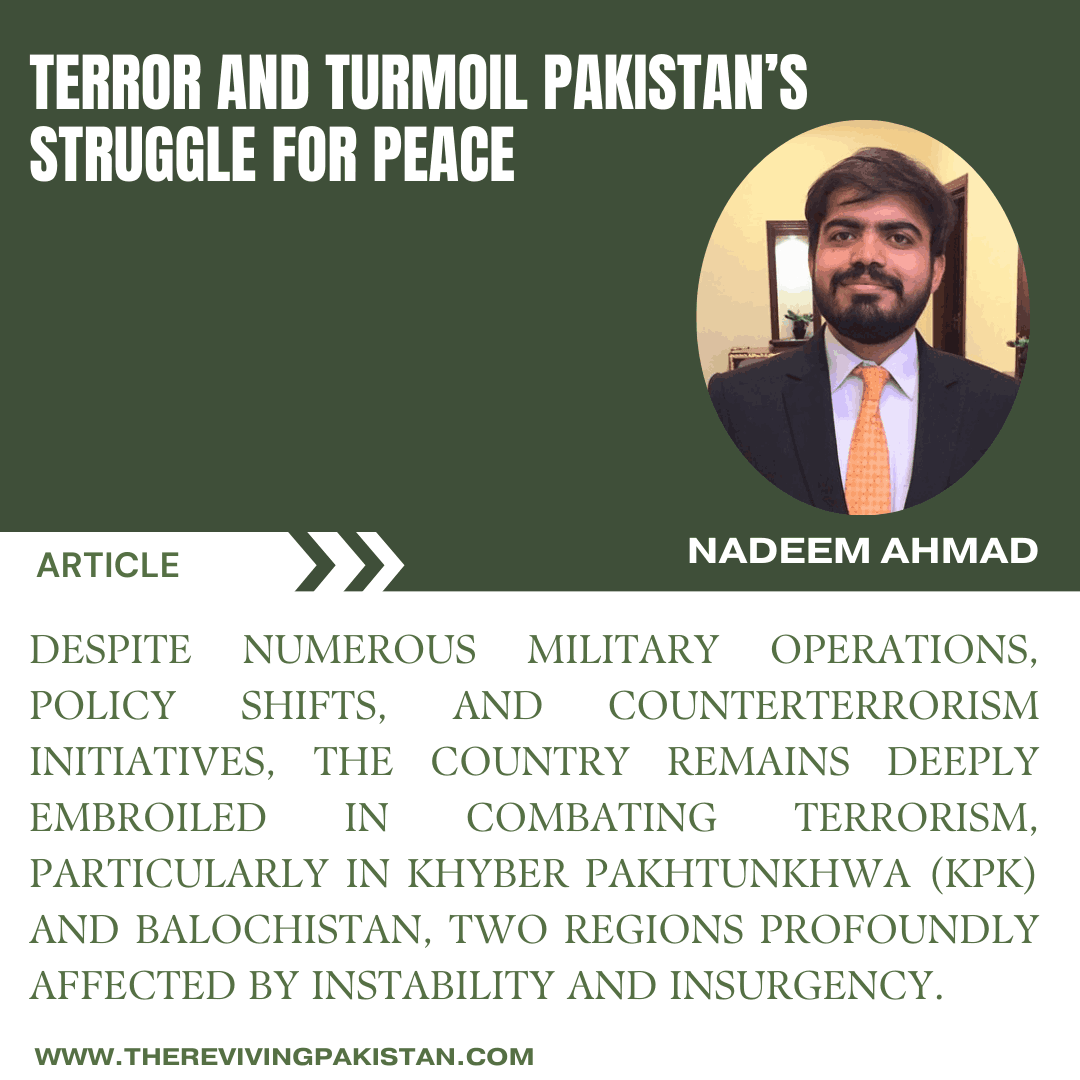About the Author(s)

Nadeem Ahmad Bugti
The author is a graduate with a Bachelor’s degree in International Relations. He is intensely interested in international and local politics and occasionally writes about political issues, climate change, and the Sustainable Development Goals (SDGs). Through his writing, he aims to contribute to discussions that matter and reflect on the challenges our world faces today.
Since the early 2000s, Pakistan has grappled with an intensifying threat of terrorism. What initially stemmed from the aftermath of the Soviet-Afghan war, which brought a rise in non-state militant actors in the region, has now evolved into a prolonged and multifaceted battle for internal security. Despite numerous military operations, policy shifts, and counterterrorism initiatives, the country remains deeply embroiled in combating terrorism, particularly in Khyber Pakhtunkhwa (KPK) and Balochistan, two regions profoundly affected by instability and insurgency.
Pakistan’s involvement in the U.S.-led war on terror following the September 11 attacks placed the country at the forefront of global counterterrorism efforts. The military carried out several operations against terrorist outfits, such as the Tehrik-e-Taliban Pakistan (TTP), with mixed results. Although some tactical successes were achieved, many of these operations have been marked by significant missteps, both strategically and in their aftermath.
For instance, military campaigns like Operation Rah-e-Rast (2009) and Operation Zarb-e-Azb (2014) aimed to flush out militants from KPK and the tribal areas. While these operations succeeded in dislodging terrorist strongholds, they failed to address the deeper, underlying socio-political grievances of the local populations. The lack of comprehensive, long-term planning and failure to rebuild these war-torn regions effectively created a vacuum that allowed militancy to resurface. Without sustainable efforts to provide education, economic opportunities, and social justice, these regions remain susceptible to the influence of extremist ideologies and insurgent groups.
While Pakistan has made considerable progress in executing counterterrorism operations, political instability has compounded the problem, creating an environment where terrorism continues to thrive. Corruption within the political system, alongside the self-serving actions of political figures, has undermined the state’s capacity to fight extremism effectively. Many political leaders have been accused of directly or indirectly benefiting from terrorism, particularly in regions like Balochistan. Here, political elites and other groups often profit from the ongoing violence and chaos. Their involvement in mega projects like the China-Pakistan Economic Corridor (CPEC) has helped them maintain control over valuable resources, while the common people—particularly the middle class and marginalized communities—continue to bear the brunt of the suffering.
In KPK, the political leadership has similarly failed to address the region’s critical socio-economic needs. The continuing rise of militancy in these areas underscores the inefficacy of governance and the vested interests of those in power who appear more focused on maintaining the status quo than ensuring regional stability. As a result, the state’s counterterrorism measures are often undermined by a lack of political will and ineffective governance.
Several large-scale military operations have been launched against terrorist groups in both KPK and Balochistan over the years. While these operations disrupted militant networks and reduced the number of terrorist attacks, they also resulted in significant civilian casualties and large-scale displacement of local populations. The humanitarian toll of these military campaigns has been immense, contributing to widespread distrust of the state among the local populace.
In KPK, operations like Zarb-e-Azb targeted groups such as the TTP and were largely considered successful in reducing terrorist activity. However, the long-term aftermath of these operations has exposed significant flaws in Pakistan’s approach to counterinsurgency. The failure to rebuild infrastructure, create economic opportunities, and provide security for displaced populations has left these regions vulnerable to the resurgence of militancy. The lack of a coherent follow-up strategy has allowed insurgent groups to regroup and re-establish their presence in the region, leading to a persistent cycle of violence.
The aftermath in Balochistan has been even less favorable. Balochistan, a region historically plagued by ethnic tensions, separatist movements, and resource disputes, remains a hotbed of unrest. Both Baloch nationalist groups and Islamist militants have used the province’s instability to further their own agendas. Following military operations in the region, grievances over human rights violations, enforced disappearances, and the exploitation of natural resources have only deepened. The military’s heavy-handed approach to suppressing insurgencies has often alienated the local populace rather than integrating them into the national fold. This has left Balochistan in a state of chronic unrest, with no clear path to reconciliation in sight.
Fast-forward to 2024, and Pakistan is once again preparing for another round of counterterrorism operations in KPK. This time, the operations specifically target the resurgence of the TTP, which has regained strength in recent years. However, unlike previous efforts, there is growing skepticism that these new operations will address the root causes of militancy. Many fear that the government’s approach is once again reactive rather than preventive, lacking the vision and strategy required to tackle the deep-seated ideological, economic, and social factors driving militancy in the region. Instead, the focus appears to be on short-term military gains, with little consideration given to long-term peacebuilding and development.
Meanwhile, militancy in Balochistan continues to rise, raising serious concerns about the region’s future. As violence escalates, many are left questioning what, if anything, the political leadership is doing to address these pressing issues. The focus of many elected officials seems to be on securing their personal interests, often at the expense of the well-being of their constituents. As a result, the middle class and marginalized groups in Balochistan suffer disproportionately, caught in the crossfire between state forces and militant groups, with no meaningful solution in sight.
The 2014 Army Public School (APS) attack in Peshawar, which resulted in the tragic loss of over 140 children, was a watershed moment for Pakistan. In the wake of this national tragedy, the state launched the National Action Plan (NAP), aimed at eradicating terrorism and curbing extremist ideologies. Initially, NAP showed promise, particularly in coordinating military and intelligence efforts across different regions. However, its momentum quickly faltered. The lack of sustained political will and half-hearted implementation of key reforms—such as regulating madrassas (religious schools) and overhauling the criminal justice system—meant that terrorism and extremism continued to plague Pakistan, albeit at a reduced scale.
To genuinely overcome the ongoing threat of terrorism, Pakistan must take a multifaceted approach. Military operations alone, while essential for immediate security, will not suffice to secure lasting peace. Instead, the government must prioritize a broader strategy that addresses the root causes of militancy and extremism:
- Socio-Economic Development: The government needs to invest heavily in the socio-economic uplift of regions like KPK and Balochistan. Education, healthcare, infrastructure, and job creation must become top priorities. By addressing poverty, illiteracy, and unemployment—factors that drive recruitment into extremist groups—the government can weaken the appeal of militant ideologies and provide people with alternative pathways to improve their livelihoods.
- Political Reforms: Corruption and political instability have hampered Pakistan’s counterterrorism efforts. It is essential to hold political leaders accountable for their actions and promote greater transparency in governance. In regions like Balochistan, where local elites often prioritize personal gain over public service, the government must ensure that leadership serves the interests of the people, not just a privileged few.
- Inclusive Dialogue: The state must engage in meaningful dialogue with local leaders, community representatives, and civil society groups in conflict-affected regions. Rather than alienating local populations through military force, the state should address grievances, negotiate peacefully, and promote a sense of national inclusion. Only by fostering a genuine partnership with the people can the state hope to achieve long-term stability.
- Counter-Narratives to Extremism: The ideological battle against extremism is just as important as the physical battle. Pakistan must work to counter extremist ideologies by promoting a more tolerant and inclusive understanding of Islam. Strengthening the national educational curriculum to include lessons on critical thinking, tolerance, and civic responsibility will help reduce the appeal of extremist narratives among young people.
- Judicial and Police Reforms: Pakistan’s criminal justice system and law enforcement agencies need significant reforms to more effectively combat terrorism. Enhancing the capacity of the police, improving intelligence gathering, and ensuring that terrorism-related cases are processed swiftly and fairly will contribute to a more robust counterterrorism framework.
By addressing both the military and ideological fronts and implementing long-overdue reforms, Pakistan can finally create a stable and peaceful future—one free from the scourge of terrorism that has plagued the nation for far too long.

